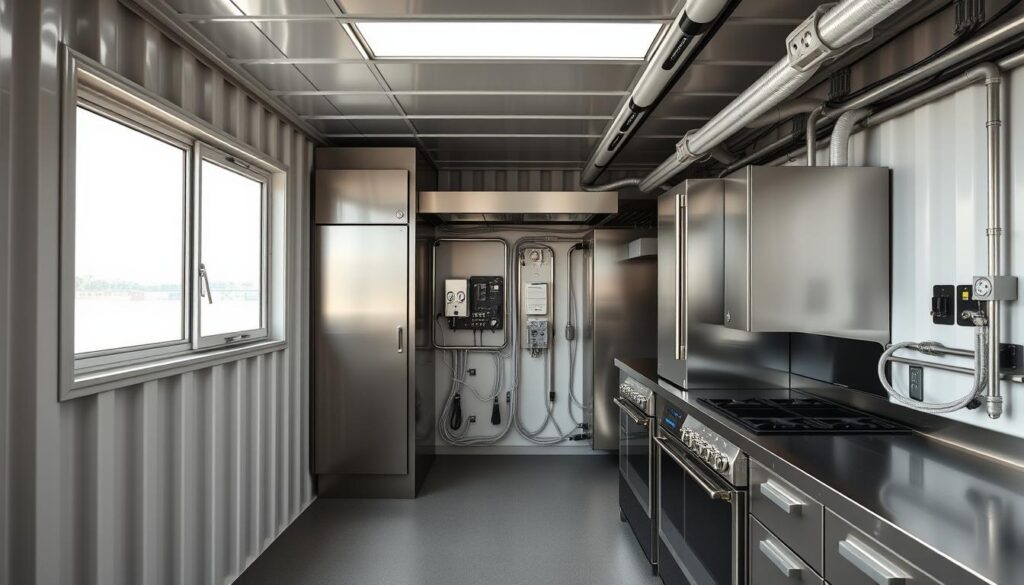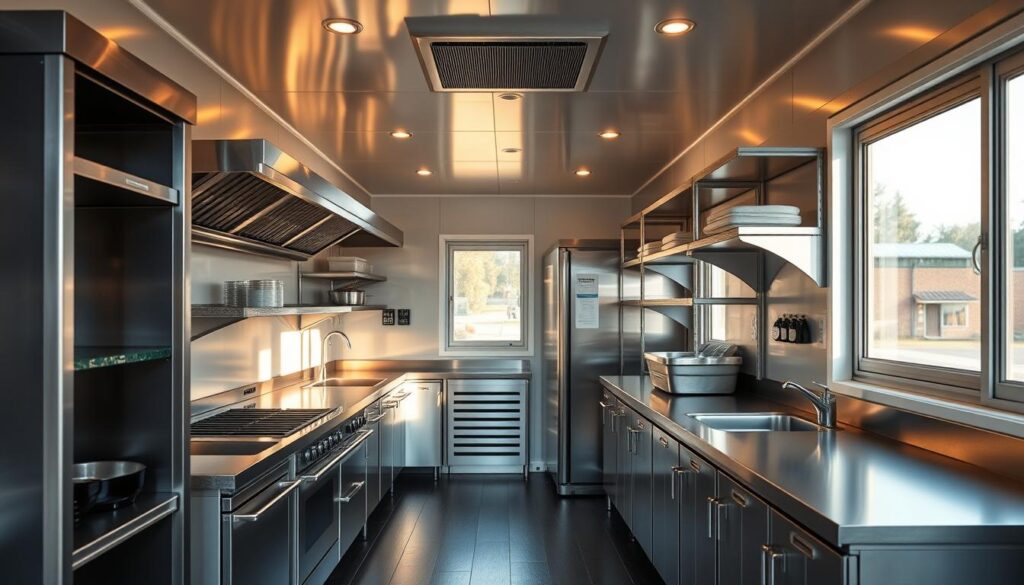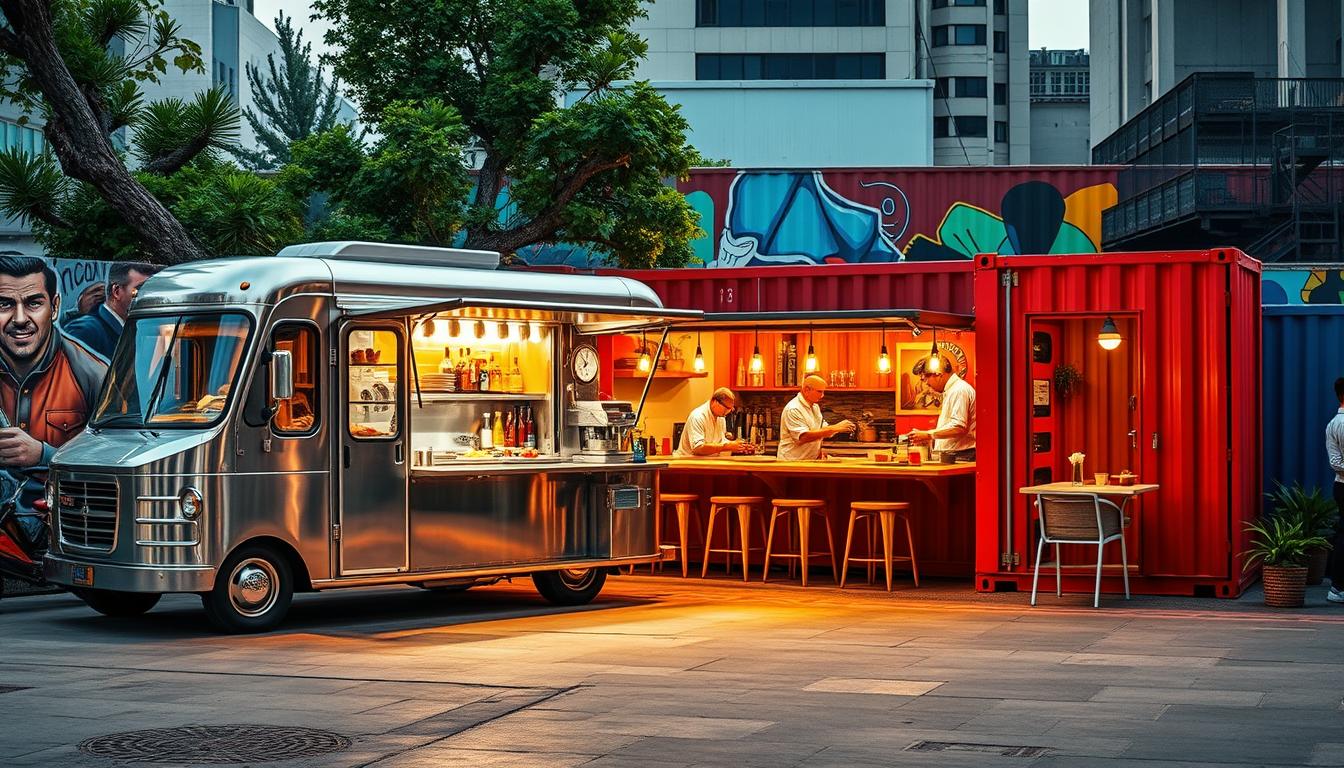Are you a food entrepreneur looking for a flexible and cost-effective way to launch or expand your business? Can a shipping container be transformed into a fully functional kitchen? The answer is yes, and it’s becoming increasingly popular among food entrepreneurs.
Efficient mobile kitchens are revolutionizing the way food businesses operate. Companies like Aztec Container and ContekPro specialize in custom container kitchen solutions, providing entrepreneurs with the flexibility to cook, serve, and sell their products from anywhere.
The rise of container kitchens is driven by their efficiency, mobility, and cost-effectiveness. These kitchens offer a unique opportunity for food entrepreneurs to test new markets, events, or concepts without the burden of a traditional brick-and-mortar kitchen.
Key Takeaways
- Container kitchens offer a flexible and cost-effective solution for food entrepreneurs.
- Custom container kitchen solutions are available from companies like Aztec Container and ContekPro.
- Efficient mobile kitchens provide the flexibility to cook, serve, and sell products from anywhere.
- Container kitchens are driven by their efficiency, mobility, and cost-effectiveness.
- They offer a unique opportunity to test new markets, events, or concepts.
The Rise of Container Kitchens in the Food Industry
In recent years, the rise of container kitchens has transformed the mobile food service landscape, providing a versatile solution for food businesses. This shift is part of a larger evolution in the food industry, driven by changing consumer preferences and technological advancements.
Evolution of Mobile Food Service Concepts
The concept of mobile food service has undergone significant changes over the years, from traditional food trucks to more sophisticated container kitchens. These mobile kitchens offer a unique blend of mobility and operational efficiency, allowing food entrepreneurs to reach a wider audience.
Why Container Kitchens Are Gaining Popularity
Container kitchens are gaining popularity due to their cost-effectiveness and flexibility. They provide a fully functional kitchen space that can be easily transported to different locations, making them an ideal solution for food entrepreneurs looking to test new markets or operate in multiple locations.
Current Market Trends in the United States
The United States is witnessing a surge in demand for mobile food services, driven by consumer preferences for unique dining experiences. Container kitchens are well-positioned to capitalize on this trend, offering a food truck alternative that combines the benefits of mobility with the advantages of a fixed kitchen space.
| Trend | Description | Impact on Container Kitchens |
|---|---|---|
| Increased Demand for Mobile Food | Rising consumer interest in mobile food services | Higher demand for container kitchens |
| Advancements in Kitchen Technology | Improved equipment and operational efficiency | Enhanced profitability for container kitchen operators |
| Flexibility and Mobility | Ability to operate in multiple locations | Increased market reach for container kitchen businesses |
Container Kitchens: Efficient, Mobile Solutions for Food Entrepreneurs
Container kitchens have revolutionized the food industry by providing efficient, mobile solutions for entrepreneurs. These innovative kitchens are designed to be flexible and adaptable, meeting the diverse needs of food businesses.
Definition and Core Concepts
A container kitchen is a fully functional kitchen built within a shipping container, offering a compact and efficient space for food preparation. The core concept revolves around mobility, flexibility, and cost-effectiveness, making it an attractive option for startups and established businesses alike.
Types of Container Kitchen Solutions
Container kitchens come in various forms, each catering to different business needs. The primary types include:
- Fully converted shipping containers
- Modular kitchen units
- Pop-up container kitchens
Fully Converted Shipping Containers
Fully converted shipping containers are entirely transformed into functional kitchens, equipped with necessary appliances and infrastructure. Companies like ContekPro offer modular kitchen solutions that are delivered pre-assembled for fast and easy installation.
Modular kitchen units are designed to be highly customizable and can be easily integrated into existing infrastructure. They offer a flexible solution for businesses that require specific kitchen layouts.
Pop-up Container Kitchens
Pop-up container kitchens are temporary or seasonal setups, ideal for events, festivals, or promotional activities. They provide a quick and efficient way to establish a kitchen presence in various locations.
By understanding the different types of container kitchen solutions, food entrepreneurs can make informed decisions about their business operations, leveraging the benefits of mobility, flexibility, and cost-effectiveness.
Key Benefits of Container Kitchens for Food Startups
Container kitchens are becoming the go-to solution for food startups, offering a unique blend of efficiency, scalability, and sustainability. These mobile kitchens provide food entrepreneurs with the flexibility and cost-effectiveness needed to succeed in a competitive market.
Cost-Effectiveness Compared to Traditional Establishments
One of the primary advantages of container kitchens is their cost-effectiveness. Compared to traditional brick-and-mortar establishments, container kitchens require significantly lower initial investment and operational costs. For instance, converting a 40ft refrigerated container into a kitchen can be a cost-effective solution for food businesses, allowing them to allocate more resources to marketing and menu development.
Mobility and Location Flexibility
Container kitchens offer unparalleled mobility and location flexibility. Food startups can easily move their operations to different locations, capitalizing on high-demand events or changing consumer trends. This mobility also allows businesses to test new markets without the commitment of a permanent location.
Scalability for Growing Businesses
As food startups grow, container kitchens can be easily scaled to meet increasing demand. Businesses can add more containers or modify existing ones to expand their operations, making it an ideal solution for rapidly growing companies.
Sustainability and Environmental Benefits
Container kitchens also offer significant sustainability and environmental benefits. By repurposing shipping containers, food startups can reduce waste and minimize their environmental footprint. Additionally, many container kitchens are designed with energy-efficient equipment and sustainable practices in mind.
| Benefit | Description | Advantage |
|---|---|---|
| Cost-Effectiveness | Lower initial investment and operational costs | More resources for marketing and menu development |
| Mobility | Easily move operations to different locations | Capitalize on high-demand events and test new markets |
| Scalability | Easily add or modify containers to expand operations | Ideal for rapidly growing businesses |
| Sustainability | Reduce waste by repurposing shipping containers | Minimize environmental footprint |
Container Kitchens vs. Food Trucks: Making the Right Choice
When deciding between a container kitchen and a food truck, entrepreneurs must consider several key factors that can impact their business’s success.
Space and Operational Comparisons
Container kitchens offer more space and flexibility compared to food trucks, allowing for a wider range of menu options and more efficient food preparation.
Key differences in space: Container kitchens typically provide between 200 to 400 square feet of operational space, while food trucks usually range from 100 to 200 square feet.
| Feature | Container Kitchen | Food Truck |
|---|---|---|
| Average Space (sq ft) | 200-400 | 100-200 |
| Menu Flexibility | High | Limited |
| Operational Efficiency | High | Moderate |
Investment Differences
The initial investment for container kitchens is generally higher than for food trucks, but container kitchens can offer long-term cost savings through their ability to operate in multiple locations.
When Each Option Makes More Sense
Container kitchens are ideal for businesses that require more space and flexibility, while food trucks are better suited for smaller operations or those with limited menu offerings.
Designing an Efficient Container Kitchen Layout
Designing an efficient container kitchen layout is crucial for food entrepreneurs who want to maximize their mobile kitchen’s potential. A well-planned layout not only enhances operational efficiency but also improves customer satisfaction.
Space Optimization Techniques
To optimize space in a container kitchen, it’s essential to utilize every available inch effectively. This can be achieved by using modular equipment and multi-functional appliances that serve more than one purpose. For instance, a combination oven and steamer can significantly reduce the space required for separate units.
Essential Equipment Considerations
The choice of equipment is critical in a container kitchen. Energy-efficient appliances not only reduce operational costs but also minimize the kitchen’s environmental footprint. Essential equipment typically includes refrigeration units, cooking appliances, and dishwashing facilities.
| Equipment | Function | Energy Efficiency |
|---|---|---|
| Refrigeration Units | Food Storage | High |
| Cooking Appliances | Food Preparation | Medium |
| Dishwashing Facilities | Cleaning | High |
Workflow and Operational Efficiency
A well-designed workflow is vital for the smooth operation of a container kitchen. This involves organizing the kitchen into zones for food preparation, cooking, and serving. By minimizing the distance between these zones, staff can work more efficiently, reducing the risk of accidents and improving overall productivity.
Customer Interaction Zones
Creating an inviting and functional customer interaction zone is crucial for enhancing the customer experience. This area should be designed to facilitate easy ordering and pickup of food, with clear signage and adequate space for customers to wait.
By focusing on these key aspects, food entrepreneurs can create a container kitchen that is not only efficient but also appealing to customers, ultimately contributing to the success of their mobile food business.
Technical Requirements and Infrastructure
Establishing a container kitchen requires careful consideration of its technical infrastructure. A well-planned infrastructure ensures that the kitchen operates efficiently, safely, and in compliance with health regulations. This involves several key components that work together to create a functional and sustainable food service environment.
Plumbing and Water Systems
One of the critical aspects of a container kitchen’s infrastructure is its plumbing and water systems. These systems must be designed to meet the demands of a commercial kitchen, including adequate water supply, proper drainage, and compliance with health department regulations. For instance, container kitchen solutions often incorporate water-efficient systems and greywater reuse to minimize water consumption.
Electrical Requirements
Container kitchens have specific electrical requirements to power their equipment and lighting. This includes sufficient electrical supply, appropriate wiring, and safety measures such as circuit breakers and GFCI outlets. Energy-efficient lighting and equipment can also help reduce the overall electrical demand and operating costs.

Ventilation and Fire Safety
Proper ventilation is crucial in a container kitchen to remove cooking fumes, heat, and moisture. This is typically achieved through a commercial-grade exhaust hood and ductwork system. Additionally, fire safety measures such as fire suppression systems and emergency exits are essential to ensure a safe working environment.
Internet and POS Systems
In today’s digital age, container kitchens also need to consider their internet and point-of-sale (POS) systems. A reliable internet connection is necessary for online ordering, inventory management, and customer engagement. A modern POS system helps streamline transactions, manage sales data, and improve customer service.
By focusing on these technical requirements and infrastructure components, container kitchen operators can create a efficient, safe, and profitable business. For more insights on container kitchen solutions, visit https://containertrends.com/.
From Concept to Reality: Building Your Container Kitchen
Building a container kitchen from the ground up requires careful planning and execution. This process involves several critical steps, from sourcing the right container to managing the project timeline.
Sourcing the Right Container
The first step in building your container kitchen is sourcing the right container. Companies like Aztec Container offer customized container kitchen solutions, providing a solid foundation for your mobile kitchen. When selecting a container, consider factors such as size, condition, and any necessary modifications to meet your business needs.
Working with Conversion Specialists
Once you have your container, working with conversion specialists is crucial. These experts can help design and build out your container kitchen to ensure it meets all operational and health department requirements. Their expertise can save time and reduce potential costly mistakes.
DIY vs. Professional Builds
Deciding between a DIY build and hiring professionals is a significant decision. While a DIY approach can save on initial costs, professional builds offer quality, compliance, and warranty benefits. Weighing these factors is essential to making an informed decision.
Timeline and Project Management
Effective project management is key to bringing your container kitchen to life within your desired timeline. This involves coordinating with suppliers, contractors, and regulatory bodies. Creating a detailed project schedule can help manage expectations and ensure a smooth process.
| Project Phase | Timeline | Responsibility |
|---|---|---|
| Sourcing Container | 1-2 weeks | Business Owner |
| Design and Planning | 2-4 weeks | Conversion Specialist |
| Build Out | 4-8 weeks | Contractor/Conversion Specialist |
| Inspection and Compliance | 1-2 weeks | Health Department/Regulatory Bodies |
Navigating Regulations and Compliance
Regulatory compliance is a critical step for food entrepreneurs looking to launch a container kitchen business. Ensuring that your container kitchen features meet all regulatory requirements is essential for avoiding costly fines and maintaining a reputable business.
Health Department Requirements
Health department regulations vary by jurisdiction, but generally include standards for food handling, storage, and preparation. For instance, a food safety guide can provide insights into maintaining high standards. Container kitchens must adhere to these guidelines to pass health inspections.
Zoning and Permitting Challenges
Zoning laws dictate where container kitchens can operate. Understanding these regulations is crucial for portable food business solutions. Entrepreneurs must secure the necessary permits before launching their business, which can sometimes be a lengthy process.

Insurance Considerations
Insurance is a vital aspect of risk management for container kitchens. Entrepreneurs should consider liability insurance, equipment insurance, and other coverage options to protect their food entrepreneur solutions business.
Legal Structures for Container Kitchen Businesses
Choosing the right legal structure (e.g., sole proprietorship, LLC, corporation) is important for container kitchen businesses. This decision impacts taxes, liability, and operational flexibility, making it a key consideration for entrepreneurs.
By understanding and complying with these regulations, container kitchen businesses can operate smoothly and maintain a competitive edge in the market.
Marketing Strategies for Container Kitchen Success
To thrive, container kitchens must leverage their unique appeal through targeted marketing. This involves understanding the strengths of mobile kitchen designs and using them to attract customers.
Leveraging the Unique Appeal of Container Kitchens
Container kitchens offer a unique dining experience that combines mobility with sustainability. Highlighting these aspects can attract environmentally conscious customers and those looking for a novel dining experience.
Social Media and Digital Marketing Approaches
Social media platforms are crucial for promoting container kitchens. By sharing high-quality images of dishes, behind-the-scenes kitchen operations, and customer interactions, businesses can build a strong online presence.
Location-Based Promotion Tactics
Utilizing location-based promotion tactics can help container kitchens attract local customers. This includes participating in local events, partnering with nearby businesses, and using geotargeted advertising.
Building a Loyal Customer Base
Building a loyal customer base is essential for the long-term success of container kitchens. This can be achieved by offering loyalty programs, engaging with customers on social media, and consistently providing high-quality food and service.
| Marketing Strategy | Description | Benefits |
|---|---|---|
| Social Media Marketing | Utilizing platforms like Instagram and Facebook to promote the business. | Increased brand visibility, customer engagement. |
| Location-Based Promotions | Targeting local customers through events and geotargeted ads. | Attracts local customers, increases foot traffic. |
| Loyalty Programs | Rewarding repeat customers to encourage loyalty. | Builds a loyal customer base, increases repeat business. |
Conclusion: Is a Container Kitchen Right for Your Food Business?
As the food industry continues to evolve, container kitchens have emerged as a viable solution for food entrepreneurs seeking efficient, mobile, and cost-effective ways to operate their businesses. With their unique blend of flexibility, sustainability, and scalability, container kitchens offer a compelling alternative to traditional brick-and-mortar establishments and food trucks.
For food entrepreneurs looking for portable food business solutions, container kitchens provide an attractive option. By leveraging container kitchen features such as modular design and mobility, businesses can adapt quickly to changing market conditions and consumer preferences. Whether you’re launching a new food venture or expanding an existing one, a container kitchen can be a strategic investment in your future success.
To determine if a container kitchen is right for your food business, consider your operational needs, target market, and growth aspirations. By weighing the benefits of container kitchens against your business goals, you can make an informed decision that drives your food entrepreneur solutions forward.

